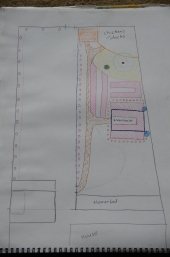






David Livingston wrote:Hi
I used to live in Weardale so I know the areaHave you given thought to intercropping your Fruit trees with Black Currents etc and are you high enough for cloud berries . How about some Bees ?
No shortage of Rain so how about some rhubarb?
David


Galadriel Freden wrote:I would like to add that we have done something similar with our similarly sized Yorkshire garden--roughly divided it into a grassy half and a growie half, and like you, we initially had the growie bit at the back of the garden, far from the house. I learned, over several years, this was just too far for me to bother gardening every day. Even though I had to walk by it to get to my chicken coop, often it went several days without me actually visiting it. Maybe it was raining, maybe I was too busy, maybe I just couldn't be bothered...in any case, I did not get back there to notice pest infestations, rampant weeds, overripe fruit, damage from cats digging, etc. Productivity was lost.
Last year I moved the main bulk of my growies to beds closest to my house, bordering on my patio. When watering my window boxes and planters, I could see any problems and deal with them immediately. It really required no extra effort, even in the rain, even when I was busy. I saw when things were ready to harvest, and harvested! When the beds were at the back of the garden and it was raining (or I was tired, or stretched for time) at dinner time, I would instead rummage through the fridge to find vegetables; this happened frequently.
Even though the farthest I had to walk from the house to the back beds was no more than 10-12m, it was still just too much of an effort. I therefore suggest keeping the veg beds closest to the house.
Good luck!

Joseph Lofthouse wrote:
Is that a curved fence around the chicken run? Curved fences tend to sag, work themselves loose, or cant. For that reason, I prefer straight fences.

Casie Becker wrote:Have you designated an area or a plan for handling garden waste such as prunings or chicken litter? Most garden excess can be easily cycled back into the soil to increase fertility, but most methods also require an area, such as a compost bin, to work in.
I'm also not seeing any type of watering plan. Do you have dry spells where you'll need supplemental water? On the other hand, are you prone to heavy or sustained rains where you need to divert the excess to avoid drowning the plants? Often you can use your land's natural slope to help manage natural rain to your best advantage, so if you're still planning, you may want to start by determining that slope.
